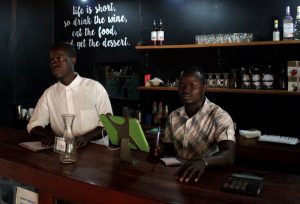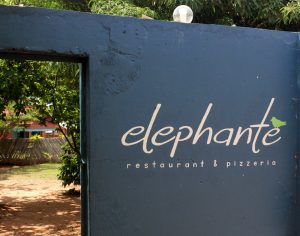Understanding the potential behind teaching someone something new
Elephanté is no more than a two or three-minute walk away from the compound, down the road and around the corner. This is why I go.
It certainly isn’t because the beer is cheap. In fact, a bottle of Tusker Lager is 4,000 Ugandan shillings, nearly $1.50 CAD, which is about 1,000 shillings more than anywhere else. No, I go there because it’s close—but that’s not the only reason to go. Elephanté makes a great pizza and, in this part of the world, for people like me who are accustomed to certain things in life, that is a big sell.
I am in Gulu, Uganda, for the summer. As a communications intern, I am tasked with creating a radio program using the voices and ideas of local young people to empower and inspire others in the community.
As part of my mandate, I’m encouraged to get comfortable and make myself at home. For the most part, that is precisely what I have done. I wouldn’t say I’m a regular at Elephanté, by any means, but I stop by often enough that the staff feel a need to reassure me there is more Tusker Lager on order when I walk through the door. I’m quite a fan of the beer, and the concern the staff at Elephanté show is an expression of their inherent hospitality.
Life is short, so drink the wine, eat the food and get the dessert. – A quote written on the walls of Elephanté
When I walk through the gate and into the open air of the restaurant’s courtyard, my eyes are immediately drawn to the café counter. This is where the light seems to focus and there are usually three or four employees waving at me and smiling. From what I understand, this is normal and, frankly, rather inviting.
With this distraction, by the time I get to the bar to order a drink or pick up a menu, I have walked past and completely ignored any guests sitting in the row of seats that face the courtyard. To be fair, the people seated there often intend to go unnoticed. They’re usually NGO workers catching up on paperwork or volunteers from overseas Skyping someone back home.

Road in Gulu, Uganda. Photo by Travis Sanderson
Sometimes, they are people just trying to take shelter from the sun. Occasionally, though, they are staff members keeping a keen yet quiet eye on things. This was where Agong Jesse was sitting the first time I noticed him.
My first impression of Jesse was that he was shy and timid—a wallflower. On the contrary, Jesse likes to be surrounded by people and thrives on hospitality. He admitted he is fond of people and said his job is a great opportunity for him to meet and speak with a wide range of people from all over the world.
On the day we met, it was Jesse who spoke first. He knew I was an intern with CEED and was curious to know what project I was working on. After I explained my goal of finding young voices of strength and inspiration in the community, I asked him if he knew anyone who fit that description who I could talk to. He flatly said that perhaps I already was.
Though his tone was soft and his smile pleasant, there was a determined look in Jesse’s eyes as we spoke. I knew there was something he wanted to say. The graceful way he talked with his hands showed me he was confident about his ideas. This was clearly not the first time he had given thought to empowering youth.
“I want to show young people how to bake,” he said, adding that he was passionate about passing along knowledge to others. When I asked him why he was so adamant about the transfer of skills, he said it was because he feels he is in a privileged position. I was impressed—I mean, you don’t really hear that in northern Uganda.

I did not have to press him as he explained that this attitude was largely due to the generosity of an American man. When Jesse was young, a man named Brian Davis, who worked with the faith-based charity Samaritan’s Purse, sponsored Jesse’s tuition fees so that he could attend a trade school to learn how to bake. I agreed that that is a fortunate position to find one’s self in, but asked him whether that was the only reason for his attitude. “No,” he replied. “My mother helped with that, too.”
His mother, Veronica, owned a restaurant when he was young. Watching her dole out hospitality to anyone who crossed the threshold, he explained, had a significant impact on him. Jesse was basically born into the hospitality business, and it wasn’t long before he was helping his mother set up her restaurant in the early mornings before school.
In fact, his mother would go so far as to invite hungry neighbourhood children to eat at the restaurant, with no expectation of payment. Jesse said this was mostly because she was someone who would rather find solutions than simply identify problems and hope they go away. At one point, his mother even took it upon herself to feed and house a handful of children from a nearby tribe that had sent them out to fend for themselves.
It was Jesse’s mother who took it upon herself to speak to the director of the local school to convince him to eliminate the school fees for the poorer children who had to leave school if they could not pay. Her persuasion worked, and the fees were waived. Now, the children could complete their secondary education for free.

area at Elephanté. Photo by Travis Sanderson
Thanks to his mother and Davis, Jesse became a pragmatic person. He said he feels the most important thing he can do with his life is help change somebody else’s for the better, even if it is just one person. He said it’s the least he can do. This philosophy extends to his work life—he said he would rather train someone to do a job rather than hire someone already qualified for the position.
I like the way Jesse looks at the world. He sees that everyone has potential if exposed to the right opportunities, and he wants those skills to be fostered. He said he also thinks each of us has the power to perform and the ability to learn if given the chance.
This is Jesse’s teach-a-man-to-fish approach to life, and he leaves me with one last remark: “Do something. Pass along your knowledge to others so that they, too, can learn.”
______
Community, Empowerment, Education, Development—or CEED—is a non-profit organization based in both Montreal and Gulu, Uganda. It works to empower youth to be agents of change in their communities through cross-cultural skills development and information sharing.
Each year, students from Concordia University travel to Uganda and work alongside Ugandan interns on various community projects that aim to benefit the youth of Gulu.
Travis Sanderson spent three months working as a communications intern in Uganda this summer. He has produced both written material and radio documentaries that reflect his experiences with the people of Uganda.
Photos by Travis Sanderson




